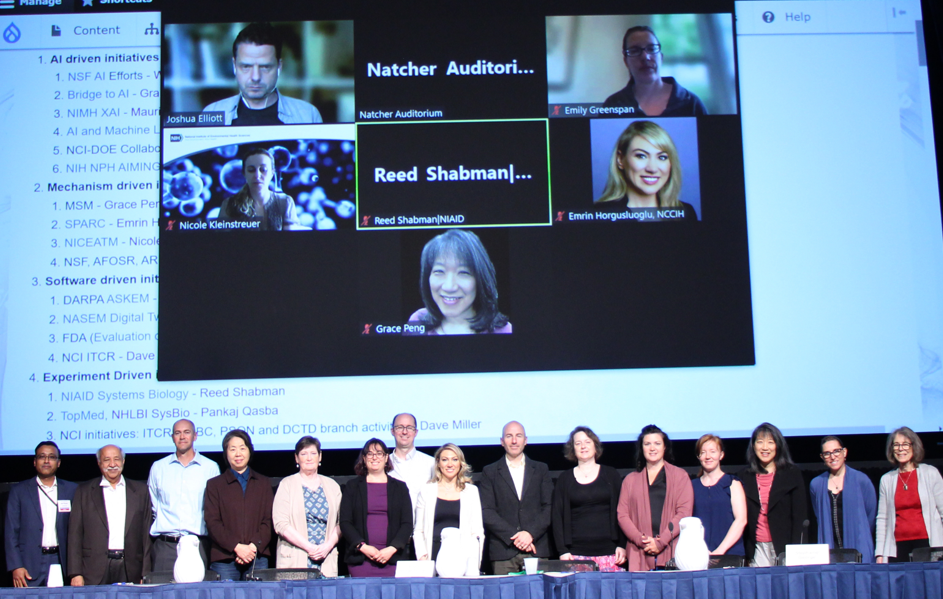Session Description: The session will present various IMAG agency initiatives that are relevant to multi-scale modeling and discuss possible opportunities/synergies for funding, collaboration and sharing of knowledge resources. The IMAG panelists below have provided summaries of the initiatives below in this presentation deck.
- AI driven initiatives
- NSF AI Efforts - Wendy Nilsen, Zhilan Feng
- Bridge to AI - Grace Peng
- NIMH XAI - Mauricio Rangel-Gomez
- AI and Machine Learning in Blood Diagnostics and Diseases - Ilana Goldberg
- NCI-DOE Collaboration, Cancer AI Accelerator- Emily Greenspan (remote)
- NIH NPH AIMINGS - Bruce Y, Lee
- Mechanism driven initiatives
- Software driven initiatives
- DARPA ASKEM - Joshua Elliott (remote)
- NASEM Digital Twins - Emily Greenspan (remote), Stephanie George
- FDA (Evaluation of Medical AI with In Silico Tools) - Elena Sizikova
- NCI ITCR - Dave Miller
- Experiment Driven initiatives
- NIAID Systems Biology - Reed Shabman
- TopMed, NHLBI SysBio - Pankaj Qasba
- NCI initiatives: ITCR, CSBC, PSON and DCTD branch activities - Dave Miller
40 minutes
Note: Audience should review the initiative materials in preparation for this session
(10 min) Intros around the table
(30 min) moderated discussion
Charge to Speakers:
1. Provide a description of your initiative(s) and any relevant accompanying materials to be made available to attendees. Use the Initiative Descriptions below, and this presentation deck to submit one slide per initiative.
Initiative Descriptions:
- Name of the initiative
- Funding agencies
- Goals of the initiative
- Current MSM activities
2. Be prepared to make a brief (<2 minutes) introduction of yourself and your initiative.
3. Be ready to discuss how multi-scale modeling is relevant to your initiative.
4. Be prepared to answer questions about your initiative from the audience. The majority of this session will be a moderated Q&A.
5. Be prepared to discuss how peer review challenges are addressed through your initiative processes. This session shouldn't focus too much on why specific proposals were scored in particular ways or issues that would be more applicable to a Center for Scientific Review (CSR) discussion.
Topics for Discussion with audience:
- How is your initiative currently relevant to MSM?
- What types of MSM activities are already occurring?
- What are potential MSM activities for the future?
- How do others get involved in your initiatives?
- How are proposals for your initiative being reviewed?
Other efforts:
AoU, Nutrition for Precision Health
Comment

Check out our interest group page: AI and Machine Learning for Blood Diagnostics and Diseases | Interagency Modeling and Analysis Group (nih.gov)
I would like to thank all our IMAG colleagues for their unwavering support of multi scale modeling. Your commitment and service are much appreciated. I would like to make a few high level remarks for discussion and maybe to seed a gap analysis:
- The economic realities of funding are pressing. The buying power of grants is decreasing as funding amounts of traditional mechanisms remain the same whereas volume of research laboratories that compete with each other and cost of conducting research are growing rapidly. Team science efforts are timely but from a financial point, this results in the dilution of funds among many groups when the mechanism is not properly invested in.
- The relevant funding programs are categorized under AI, Mechanism, Software, or Experiment driven initiatives. Many of our research programs focus on one or more areas of model creation, software development, biomedical science, and computational science. Many of us may find homes to the listed initiatives and we are appreciative of that. However, many listed initiatives are rather tightly focused on model form or disease/biological system. Without a broad theme (other than AI/ML) and co-ordinated funding programs, some of us may not find a home for our research, infrastructure projects. Thus, creation of content (models, tools) for broader ecosystem becomes piece-meal (islands in the ecosystem).
- Are there opportunities to scale meta-science projects that are agnostic to biomedical domains (model curation, workflow curation, sharing tools and practices, credibility, etc.)? As a community we seeded many of these projects but how can we sustain, transfer our experiences and grow?
Standards like SBML have significantly improved reuse and reproducibility of models in systems biology models but major gaps remain in the standards portfolio at higher scales. Are there any initiatives to support modeling standards development?
I noticed that the emphasis is on AI/ML but the IMAG community is mechanistic focused, are there any initiatives to support mechanistic modeling?
This may seem like an "obvious" thing, but could the panelists comment on the importance in bringing the statistical scientists (especially those in other scientific domains, e.g., geophysics/metrology) into the conversations surrounding data science and machine learning? Are statisticians being included enough with our math/engineering/computer science communities in the biological domain?
Could the panelists that focus on mechanistic modeling with data integration / machine learning comment on the importance and role of uncertainty quantification in the model inputs/outputs and model discrepancy in these funding opportunities?
MAny of us feel that a special study section for MSM is needed so they get us.
Emily Greenspan mentioned an upcoming white paper based on a successful workshop of new methods for dealing with data imbalances in relation to rare cancer types, etc. Would it be possible to know more about what journal or preprint repository this will be submitted to do create an alert for it? Or have a link on this wiki page when it's published later? Thank you.



